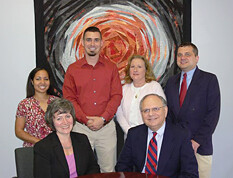
Center creates new insights
By Lesli Bales-Sherrod
UMConnection Correspondent
The first step, it's said, is admitting you have a problem. The Lewis Center for Church Leadership, housed at Wesley Theological Seminary in Washington, D.C., is helping churches do just that.
 "We look at what are the pressing issues facing congregations today and congregational life, and work on those," explained the Rev. Lovett H. Weems Jr., executive director of the center. "We take a lot of research and boil it down to actionable strategic insights."
"We look at what are the pressing issues facing congregations today and congregational life, and work on those," explained the Rev. Lovett H. Weems Jr., executive director of the center. "We take a lot of research and boil it down to actionable strategic insights."
Out of research and field testing come these insights that guide church leaders who already want to address an issue, but need reliable information on best practices to do so, Weems explained in his report to Wesley faculty in November.
"If you follow these actionable strategic insights, your chances of success have gone up," he said in an interview about the center in January. That's why discerning these insights is the Lewis Center's goal in any area of work.
The key, though, is figuring out which challenges to tackle, Weems said.
Five years into its ministry, the Lewis Center Steering Committee has chosen three areas of focus for the next five years:
- Reaching more people, younger people and more diverse people;
- Clergy effectiveness and leadership development; and
- Funding the church's vision.
"There is no future for United Methodists in the United States unless we can learn to reach more people, younger people and more diverse people," Weems said. "And it's unlikely that the church is going to be able to reach younger people," when only 5 percent of Elders are under 35 years old.
"That has decreased a lot in the last 20 years; it's a very dramatic trend," said Ann A. Michel, associate director of the Lewis Center. "Everyone knew we had no young clergy, but (the church) had never named it as a problem."
Weems and Michel have written a book, "The Crisis of Young Clergy," and are trying to let this demographic know about resources available to them. Again, it comes back to providing actionable strategic insights, Weems said: "If you want to be successful, this is what you can learn."
Another part of reaching more people, younger people and more diverse people is identifying actionable strategic insights that congregations can put into practice.
"Most people sitting in the pews say they want more people, younger people and more diverse people, but they don't do what it takes to do that," Michel said.
The Lewis Center makes its research and resources available to the public through its Web site, http://www.churchleadership.com/. Among its offerings are "Leading Ideas," a free biweekly electronic newsletter that has almost 6,000 subscribers already, and the popular "50 Ways to Build Strength" series, which provides tips for enhancing areas of ministry that are vital to church growth.
A second focus for the next five years is clergy effectiveness and leadership development.
"What we're talking about are clergy who are doing OK, but feel they don't get the feedback that they need," Weems explained.
To this end, the Lewis Center will debut this fall its Lewis Pastoral Leadership Inventory, which is in its final phase of field testing. The new inventory "uses online questionnaires to assess how pastors see their strengths and weakness and how they are seen by observers familiar with their pastoral work," according to the Lewis Center Web site. "This approach integrates self appraisal with peer feedback providing comprehensive input for improvement and growth in ministry."
"What's most important is the conversations it makes possible," Weems said. "‘You rated me significantly higher than I did on this; what's going on there?' ... You start seeing what really connects to people."
The new inventory is based on 75 specific criteria, Michel noted, and is a "very research-based tool." It helps clergy and congregations "understand what effectiveness is," she said, and "focuses on fruitfulness."
To address its third focus, the Lewis Center will hold a "Funding Your Congregation's Vision" workshop 9 a.m.to 12:30 p.m. March 21, at St. Stephen's UMC in Burke, Va. This year's event will explore new subject areas, Michel said, including enhancing resources for ministry in challenging times and ways of monitoring and expanding giving. To learn more or register for the conference, which is $30 per person, go to www.churchleadership.com/events/LCevent09.html.
While the Lewis Center continues its work helping pastors, congregations, students and whole denominations, Weems encourages churches to "get clear about their own identity."
Churches need to take a "realistic assessment of their current situations - What are their limitations? Strengths? - and get a good clear assessment of the context in which they're serving," he said. "Who's around them and, out of that, what is God calling (them) to? The longer a church has been around, the less responsive it tends to be to what's going on in its community."

Login/Register to leave comment